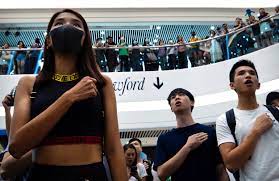HONG KONG (AFP): Hong Kong’s government said on Tuesday (Jun 6) that it had asked the city’s high court to ban the song Glory to Hong Kong, an anthem born out of huge protests in 2019.
The government has sought an injunction order, which, if granted, would make Glory to Hong Kong the first song to be banned in the city since the former British colony was handed over to China in 1997.
The song, penned anonymously, first emerged in August 2019 when Hong Kong saw massive and at times violent demonstrations calling for political change.
A defiant protest anthem, it integrated a key protest slogan – “break now the dawn, liberate our Hong Kong; in common breath, revolution of our times” – in its Cantonese lyrics and became the unofficial soundtrack of the demonstrations.
It is now all but illegal to sing or play it, after Beijing crushed the protests and passed a sweeping national security law in 2020 to quell political dissent.
The government said on Tuesday that its decision to ask the court for a ban came because Glory to Hong Kong was frequently being mistaken for the city’s official anthem.
The proposed injunction “is to restrain anyone from disseminating or performing, etc, the song with the intention of inciting others to commit secession, or with a seditious intent, or … with the intent to insult the national anthem”.
The government has also sought to ban “any adaptation” of the song or its melody.
If the injunction is granted, people will not be able to broadcast, perform, share or reproduce Glory to Hong Kong in the city.
Under the national security law, the offence of inciting secession carries up to 10 years in prison.
Insulting the national anthem and sedition carry sentences of three and two years in prison, respectively, under a separate law.
Officially, Hong Kong does not have its own anthem. China’s national anthem is March of the Volunteers.
Since last November, Hong Kong’s government has filed protests over the use of Glory to Hong Kong, after repeated instances of the song being mistakenly played as the city’s anthem at international sporting events.
The government also demanded that search engine Google remove the protest song from its search results, but the tech giant refused to comply.
Musicians who have played the song in public have been targeted by authorities.
Li Jiexin, 69, is currently on trial for four counts of “unlicensed performance” after playing Glory to Hong Kong with an erhu, a two-string Chinese instrument, around the city in 2021 and 2022.







